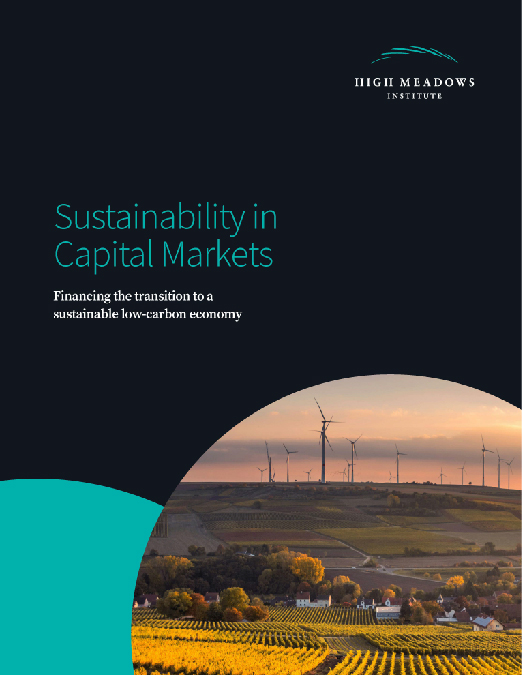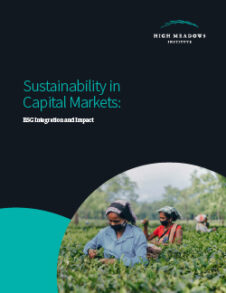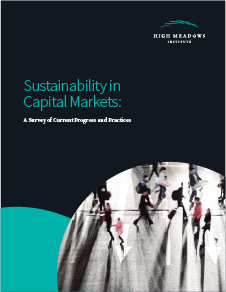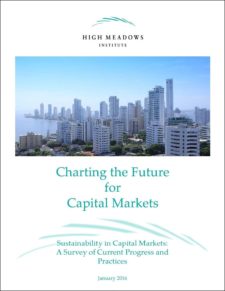
Since 2016, High Meadows Institute has tracked progress on the market integration of ESG and sustainable finance in our flagship Sustainability in Capital Markets reports. In our 2025 report, we turn our focus to the climate crisis, exploring how key sectors in the financial system are engaging with the transition to a sustainable low-carbon economy (SLCE). The analysis, divided into individual sector snapshots, assesses the current roles of asset owners, asset managers, market intermediaries and other players in accelerating the transition, evaluating their level of commitment, as well as reflecting on the drivers and challenges to increasing support. In-depth case studies identify and analyze the practices of leading firms who are pioneering the use of system-level investing to address systemic issues like climate change. We welcome your feedback on our findings, as well as suggestions of areas for further research on strengthening financial sector support for the climate transition.
Target sectors
This report provides snapshots of how key sectors in capital markets and the financial system are currently supporting the SLCE transition. The sectors have been divided into two tiers based on availability of data:
Tier 1 Sectors:
- Asset managers
- Insurance firms
- Investment banks
- Pension funds
- Private equity firms
Tier 2 Sectors:
- Investment consultants
- Family offices
- Stock exchanges
- Sovereign wealth funds
- Business schools


Sharing our findings
Starting in early 2025, HMI began releasing sector profiles that provide snapshots of the key capital market players’ unique roles in the SLCE transition. These profiles are based on a literature review of studies on each sector, as well as a more detailed analysis of how the top ten largest institutions in the sector are supporting the SLCE transition and an exploration of the sector’s strengths, gaps, and potential to elevate its SLCE support. More information can be found in the Methodology document below.
Some sector snapshots also include an in-depth case study on a leader in the SLCE transition, examining the drivers and incentives that motivated the firms to take leadership, how their strategy evolved and how they operationalized and executed the strategy to achieve success.
Introduction & Methodology
View the report background, as well as the assessment framework used to evaluate the level of support for the transition to a sustainable low-carbon economy among key sectors in the capital markets and the methodology used to develop the case studies.
Sector profiles & case studies
Download sector snapshots examining how the financial market’s key actors currently approach the SLCE transition and in-depth case studies highlighting leaders in implementing system-level investing.
Project partners

17 Communications is a mission-driven marketing and communications consultancy specializing in the ESG, impact investing and sustainable finance sectors. We are committed to catalyzing the flow of capital towards sustainability and impact-oriented investments and solutions through a combination of communications, advocacy, research and education. Learn more at www.17c.org.

TIIP’s mission is to help investors understand how healthy social, environmental, and financial systems can benefit their portfolios. TIIP provides consulting services, applied research, and a turnkey solution (SAIL) that supports investors’ pursuit of system-level investing, an advanced approach to sustainable and impact investing that focuses on managing systemic risks and investing in solutions to systemic problems. For more information, visit www.tiiproject.com.
Advisory board
High Meadows Institute thanks the following members of the 2025 Sustainability in Capital Markets Advisory Board for their support and feedback on the development of this project:
- Caroline Flammer, School of International and Public Affairs (SIPA), Columbia University
- Emilie Goodall, Fidelity International
- Witold J. Henisz, The Wharton School, The University of Pennsylvania
- Piers Hugh Smith, Franklin Templeton
- Jon Lukomnik, Sinclair Capital
- Steve Lydenberg, Domini Impact Investments
- Asha Mehta, Global Delta Capital
- Andrew Parry, JO Hambro Capital Management
- Paul Schneider, Ontario Teachers’ Pension Plan (retired)




